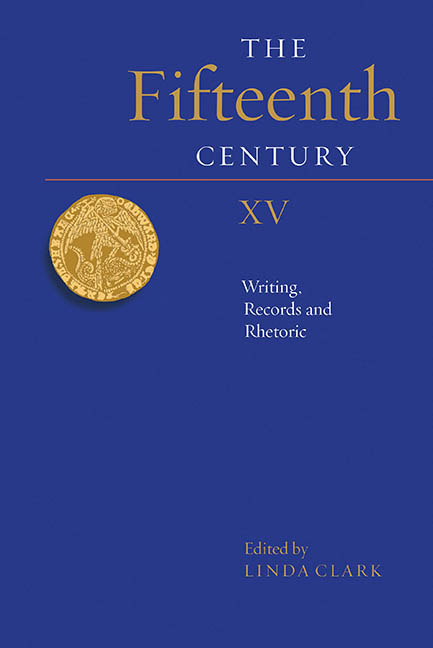Book contents
- Frontmatter
- Contents
- List of Illustrations
- Contributors
- Preface
- Abbreviations
- The Libelle of English Policy: The Matter of Ireland
- ‘Stories of Divers Regions and Provinces’: Some Digests of History and Geography for Late-Medieval English Readers
- ‘To please … Dame Cecely that in latyn hath litell intellect’: Books and the Duchess of York
- A Case Study in Lancastrian Service and Personal Survival: The Career of William, Lord Roos of Helmsley (c.1370–1414)
- Identity, Discourse and Political Strategy: Margrave Albrecht Achilles (1414–86) and the Rhetoric of Antagonism between Town and Nobility in Upper Germany
- The Redistribution of Forest Law and Administration in Fifteenth-Century England
- Well-Connected and Qualified Clerics? The Bishops of Dunkeld and Sodor in the Fifteenth Century
- Preaching Politics: Lancastrian Chancellors in Parliament
- Bishop John Alcock and the Roman Invasion of Parliament: Introducing Renaissance Civic Humanism to Tudor Parliamentary Proceedings
- Preaching on Magna Carta at the end of the fifteenth century: john alcock's sermon at paul's cross
- Index
- CONTENTS OF PREVIOUS VOLUMES
A Case Study in Lancastrian Service and Personal Survival: The Career of William, Lord Roos of Helmsley (c.1370–1414)
Published online by Cambridge University Press: 23 August 2019
- Frontmatter
- Contents
- List of Illustrations
- Contributors
- Preface
- Abbreviations
- The Libelle of English Policy: The Matter of Ireland
- ‘Stories of Divers Regions and Provinces’: Some Digests of History and Geography for Late-Medieval English Readers
- ‘To please … Dame Cecely that in latyn hath litell intellect’: Books and the Duchess of York
- A Case Study in Lancastrian Service and Personal Survival: The Career of William, Lord Roos of Helmsley (c.1370–1414)
- Identity, Discourse and Political Strategy: Margrave Albrecht Achilles (1414–86) and the Rhetoric of Antagonism between Town and Nobility in Upper Germany
- The Redistribution of Forest Law and Administration in Fifteenth-Century England
- Well-Connected and Qualified Clerics? The Bishops of Dunkeld and Sodor in the Fifteenth Century
- Preaching Politics: Lancastrian Chancellors in Parliament
- Bishop John Alcock and the Roman Invasion of Parliament: Introducing Renaissance Civic Humanism to Tudor Parliamentary Proceedings
- Preaching on Magna Carta at the end of the fifteenth century: john alcock's sermon at paul's cross
- Index
- CONTENTS OF PREVIOUS VOLUMES
Summary
The fragile Lancastrian state survived through the loyalty, commitment and consistent stalwart service of supporters such as William, Lord Roos. The Lancastrians were beset by many institutional fragilities: rebellions; Henry IV's poor health; tensions within the inner royal circle. There were also societal fragilities – some of them, especially those impinging on law and public order, parallel to the institutional problems. The challenges to religious orthodoxy, for example, which threatened both church and state, reached their peak as Henry V was still establishing himself on the throne. Money was a constant concern. That in 1400 the former crusader Henry IV could afford to give the Byzantine emperor, Manuel II, desperate for help against the encroaching Ottomans, no more than warm words and fine food starkly illustrates the problem. It was, however, not just the difficulties themselves which created fragility: it was their consequences. Executions and deaths in battle robbed the Lancastrians of men who, otherwise, could have been capable political leaders. Significant local areas were left without adequate lordship. Roos offered stability, dependability and experience.
Although Roos never assumed major leadership responsibilities, he played a significant support role through some of the most difficult times for the Lancastrian regime until his death in September 1414. Closer to Henry IV and Archbishop Arundel than to the prince of Wales, he survived the various vicissitudes of the later part of Henry IV's reign, emerging in Henry V's as a zealous prosecutor of lollards. He survived partly because he was not sufficiently important to be removed, so while his influence sometimes waned he never disappeared entirely from the court circle. His survival may be partly attributed to the esteem in which he appeared to be increasingly held by a sometimes truculent House of Commons. Largely, however, it stemmed from his dogged loyalty to the Lancastrian cause and his usefulness not just at court but also through his notable local connections.
Roos had extensive landed interests in north Yorkshire, with a substantial castle at Helmsley, but he was not exclusively a northern magnate. Importantly, he also held lands in Leicestershire, Lincolnshire and Nottinghamshire, giving him considerable influence in these central and eastern areas.
- Type
- Chapter
- Information
- The Fifteenth Century XV , pp. 57 - 72Publisher: Boydell & BrewerPrint publication year: 2017
- 1
- Cited by

